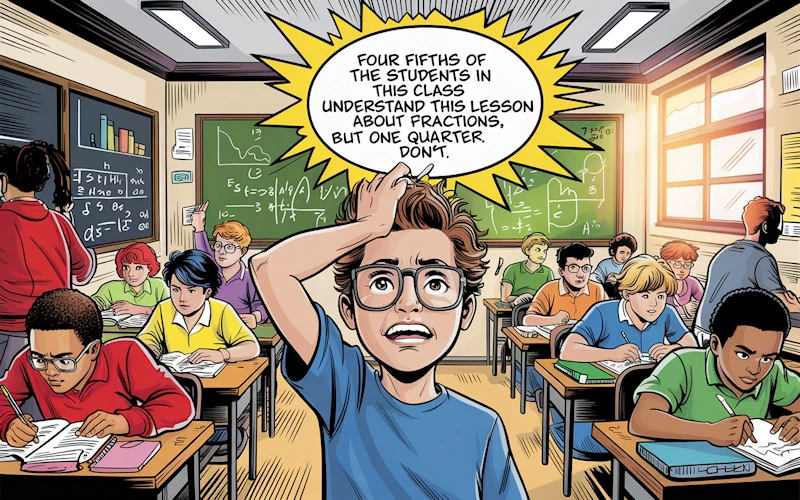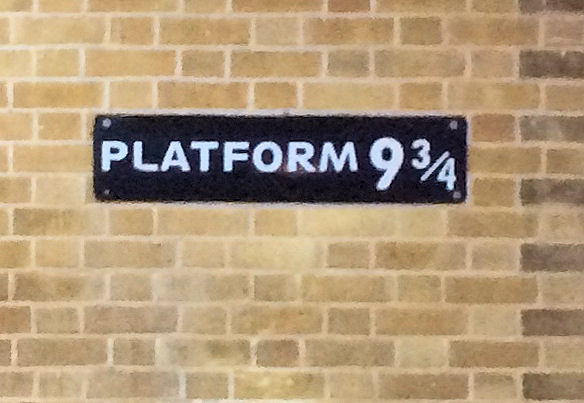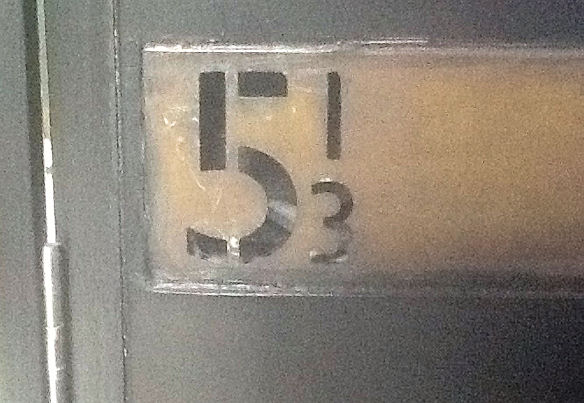

Fractions Starters:Coins On The Table: A puzzle about the number of coins on a table given information about fractions of them. Fractangle: Can you see what fractions of the shapes have been shaded? It is not as difficult as it first appears. Fraction Order: Arrange the fractions and decimals in order from smallest to largest. Fractions Decimals Percentages: Convert fractions to decimals, decimals to percentages and percentages to fractions. Giraffe: The height of this giraffe is three and a half metres plus half of its height. How tall is the giraffe? Half Hearted: Find the number which when added to the top (numerator) and bottom (denominator) of each fraction make it equivalent to one half. Halloween: Five problems with a Halloween theme. Inbetweens: Find fractions between two given values. Loopy Lake: Match the fractions to their decimal equivalents and join them with lines that do not cross. One Fifth: Investigate three fractions which add together to give one fifth. One Ninth: Investigate three fractions which add together to give one ninth. Recurring Decimal: Use your calculator to find which whole number divided by another whole number gives a recurring decimal. Refreshing Revision: It is called Refreshing Revision because every time you refresh the page you get different revision questions. Spin the Wheel: Many basic numeracy questions generated from the number selected by the wheel of fortune. Two Thirds: Make a poster showing a variety of calculations that give the answer two thirds.
Small images of these Starters :: Index of Starters Fractions Advanced Starters:Doctor's Son: The doctor's son's age does not add up! Four Fraction Division: Explain why the answer to a series of fraction divisions is a whole number. Fractions of Animals: What is three sevenths of a chicken, two thirds of a cat and 50% of a goat? Seventeen Camels: Explain the mathematics of the classic ninteenth century fraction sharing story. Sibling Count: How many boys and how many girls are there in the family? Simplify: Simplify an algebraic fraction Singers and Dancers: What fraction of the singers and dancers are both singers and dancers? Single Fraction: Simplify an expression involving fractions, exponents and a square root. Test Scores: Explore the misconception that when adding fractions you add both the numerators and the denominators
Curriculum for Fractions:Year 5Pupils should be taught to compare and order fractions whose denominators are all multiples of the same number more... Pupils should be taught to identify, name and write equivalent fractions of a given fraction, represented visually, including tenths and hundredths more... Pupils should be taught to recognise mixed numbers and improper fractions and convert from one form to the other and write mathematical statements > 1 as a mixed number [for example ⅖ + ⅘ = 1 ⅕] more... Pupils should be taught to add and subtract fractions with the same denominator and denominators that are multiples of the same number more... Pupils should be taught to multiply proper fractions and mixed numbers by whole numbers, supported by materials and diagrams more... Pupils should be taught to solve problems involving multiplication and division, including scaling by simple fractions and problems involving simple rates more... Pupils should be taught to solve problems which require knowing percentage and decimal equivalents of ½, ¼, ⅕, ⅖, ⅘ and those fractions with a denominator of a multiple of 10 or 25 more... Year 6Pupils should be taught to use common factors to simplify fractions; use common multiples to express fractions in the same denomination more... Pupils should be taught to compare and order fractions, including fractions greater than one. more... Pupils should be taught to add and subtract fractions with different denominators and mixed numbers, using the concept of equivalent fractions more... Pupils should be taught to multiply simple pairs of proper fractions, writing the answer in its simplest form more... Pupils should be taught to solve problems involving unequal sharing and grouping using knowledge of fractions and multiples. more... Pupils should be taught to divide proper fractions by whole numbers more... Pupils should be taught to associate a fraction with division and calculate decimal fraction equivalents [for example, 0.375] for a simple fraction more... Pupils should be taught to recall and use equivalences between simple fractions, decimals and percentages, including in different contexts. more... Years 7 to 9Pupils should be taught to order positive and negative integers, decimals and fractions; use the number line as a model for ordering of the real numbers; use the symbols =, ≠, <, >, ≤, ≥ more... Pupils should be taught to express one quantity as a fraction of another, where the fraction is less than 1 and greater than 1 more... Pupils should be taught to use the four operations, including formal written methods, applied to integers, decimals, proper and improper fractions, and mixed numbers, all both positive and negative more... Pupils should be taught to understand that a multiplicative relationship between two quantities can be expressed as a ratio or a fraction more... Pupils should be taught to work interchangeably with terminating decimals and their corresponding fractions (such as 3.5 and 7⁄2 or 0.375 and 3⁄8 ) more... Pupils should be taught to interpret fractions and percentages as operators more... Years 10 and 11Pupils should be taught to calculate exactly with fractions, {surds} and multiples of π ; {simplify surd expressions involving squares [for example √12 = √(4 × 3) = √4 × √3 = 2√3] and rationalise denominators} more... Exam-Style Questions:There are almost a thousand exam-style questions unique to the Transum website. Feedback:Comment recorded on the 8 May 'Starter of the Day' page by Mr Smith, West Sussex, UK: "I am an NQT and have only just discovered this website. I nearly wet my pants with joy. Comment recorded on the 1 May 'Starter of the Day' page by Phil Anthony, Head of Maths, Stourport High School: "What a brilliant website. We have just started to use the 'starter-of-the-day' in our yr9 lessons to try them out before we change from a high school to a secondary school in September. This is one of the best resources on-line we have found. The kids and staff love it. Well done an thank you very much for making my maths lessons more interesting and fun." Comment recorded on the 23 September 'Starter of the Day' page by Judy, Chatsmore CHS: "This triangle starter is excellent. I have used it with all of my ks3 and ks4 classes and they are all totally focused when counting the triangles." Comment recorded on the 1 August 'Starter of the Day' page by Peter Wright, St Joseph's College: "Love using the Starter of the Day activities to get the students into Maths mode at the beginning of a lesson. Lots of interesting discussions and questions have arisen out of the activities. Comment recorded on the 9 April 'Starter of the Day' page by Jan, South Canterbury: "Thank you for sharing such a great resource. I was about to try and get together a bank of starters but time is always required elsewhere, so thank you." Comment recorded on the 1 February 'Starter of the Day' page by Terry Shaw, Beaulieu Convent School: "Really good site. Lots of good ideas for starters. Use it most of the time in KS3." Comment recorded on the 16 March 'Starter of the Day' page by Mrs A Milton, Ysgol Ardudwy: "I have used your starters for 3 years now and would not have a lesson without one! Fantastic way to engage the pupils at the start of a lesson." Comment recorded on the 28 September 'Starter of the Day' page by Malcolm P, Dorset: "A set of real life savers!! Comment recorded on the 17 November 'Starter of the Day' page by Amy Thay, Coventry: "Thank you so much for your wonderful site. I have so much material to use in class and inspire me to try something a little different more often. I am going to show my maths department your website and encourage them to use it too. How lovely that you have compiled such a great resource to help teachers and pupils. Comment recorded on the 10 April 'Starter of the Day' page by Mike Sendrove, Salt Grammar School, UK.: "A really useful set of resources - thanks. Is the collection available on CD? Are solutions available?" Comment recorded on the 9 October 'Starter of the Day' page by Mr Jones, Wales: "I think that having a starter of the day helps improve maths in general. My pupils say they love them!!!" Comment recorded on the s /Coordinate 'Starter of the Day' page by Greg, Wales: "Excellent resource, I use it all of the time! The only problem is that there is too much good stuff here!!" Comment recorded on the 7 December 'Starter of the Day' page by Cathryn Aldridge, Pells Primary: "I use Starter of the Day as a registration and warm-up activity for my Year 6 class. The range of questioning provided is excellent as are some of the images. Comment recorded on the 6 May 'Starter of the Day' page by Natalie, London: "I am thankful for providing such wonderful starters. They are of immence help and the students enjoy them very much. These starters have saved my time and have made my lessons enjoyable." Comment recorded on the 1 February 'Starter of the Day' page by M Chant, Chase Lane School Harwich: "My year five children look forward to their daily challenge and enjoy the problems as much as I do. A great resource - thanks a million." Comment recorded on the 28 May 'Starter of the Day' page by L Smith, Colwyn Bay: "An absolutely brilliant resource. Only recently been discovered but is used daily with all my classes. It is particularly useful when things can be saved for further use. Thank you!" Comment recorded on the 19 November 'Starter of the Day' page by Lesley Sewell, Ysgol Aberconwy, Wales: "A Maths colleague introduced me to your web site and I love to use it. The questions are so varied I can use them with all of my classes, I even let year 13 have a go at some of them. I like being able to access Starters for the whole month so I can use favourites with classes I see at different times of the week. Thanks." Comment recorded on the 21 October 'Starter of the Day' page by Mr Trainor And His P7 Class(All Girls), Mercy Primary School, Belfast: "My Primary 7 class in Mercy Primary school, Belfast, look forward to your mental maths starters every morning. The variety of material is interesting and exciting and always engages the teacher and pupils. Keep them coming please." Comment recorded on the i asp?ID_Top 'Starter of the Day' page by Ros, Belize: "A really awesome website! Teachers and students are learning in such a fun way! Keep it up..." Comment recorded on the 3 October 'Starter of the Day' page by Fiona Bray, Cams Hill School: "This is an excellent website. We all often use the starters as the pupils come in the door and get settled as we take the register." Comment recorded on the s /Indice 'Starter of the Day' page by Busolla, Australia: "Thank you very much for providing these resources for free for teachers and students. It has been engaging for the students - all trying to reach their highest level and competing with their peers while also learning. Thank you very much!" Comment recorded on the 5 April 'Starter of the Day' page by Mr Stoner, St George's College of Technology: "This resource has made a great deal of difference to the standard of starters for all of our lessons. Thank you for being so creative and imaginative." Comment recorded on the 26 March 'Starter of the Day' page by Julie Reakes, The English College, Dubai: "It's great to have a starter that's timed and focuses the attention of everyone fully. I told them in advance I would do 10 then record their percentages." Comment recorded on the 12 July 'Starter of the Day' page by Miss J Key, Farlingaye High School, Suffolk: "Thanks very much for this one. We developed it into a whole lesson and I borrowed some hats from the drama department to add to the fun!" Comment recorded on the 25 June 'Starter of the Day' page by Inger.kisby@herts and essex.herts.sch.uk, : "We all love your starters. It is so good to have such a collection. We use them for all age groups and abilities. Have particularly enjoyed KIM's game, as we have not used that for Mathematics before. Keep up the good work and thank you very much Comment recorded on the 24 May 'Starter of the Day' page by Ruth Seward, Hagley Park Sports College: "Find the starters wonderful; students enjoy them and often want to use the idea generated by the starter in other parts of the lesson. Keep up the good work" Comment recorded on the 17 June 'Starter of the Day' page by Mr Hall, Light Hall School, Solihull: "Dear Transum, Comment recorded on the 18 September 'Starter of the Day' page by Mrs. Peacock, Downe House School and Kennet School: "My year 8's absolutely loved the "Separated Twins" starter. I set it as an optional piece of work for my year 11's over a weekend and one girl came up with 3 independant solutions." Comment recorded on the 2 May 'Starter of the Day' page by Angela Lowry, : "I think these are great! So useful and handy, the children love them. Comment recorded on the 3 October 'Starter of the Day' page by Mrs Johnstone, 7Je: "I think this is a brilliant website as all the students enjoy doing the puzzles and it is a brilliant way to start a lesson." Fractions External Links:Links to other websites containing resources for Fractions are provided for those logged into 'Transum Mathematics'. Subscribing also opens up the opportunity for you to add your own links to this panel. You can sign up using one of the buttons below: |
Notes:A fraction is a part of a number. Fractions are either vulgar or decimal. Vulgar fractions can be proper, improper or mixed. Equivalent fractions have the same value. Fractions Teacher Resources:Fraction Wall: The traditional fraction wall diagram showing the relationship between simple fractions. Fraction Spinners: Know the properties of the fractions randomly produced by the two spinners. Fractions Kim's Game: A memory game to be projected to help the whole class recognise basic fractions. Fractions Decimals Percentages: Revise the methods for converting fractions to decimals and percentages. How old was Diophantus?: An ancient riddle which can be answered by solving an equation containing fractions. Fractions Activities:Fraction Foundations: Recognise simple fractions (halves, quarters and tenths) of whole numbers and shapes. Fraction Line: Arrange the fractions, shown in a variety of formats, in order from smallest to largest. Equivalent Fractions: Practise finding equivalent fractions numerically and in fraction diagrams. Jack Frost Fractions: Find fractions of frosty fractions in this ten stage challenge. Equivalent Fraction Pairs: The traditional pairs or Pelmanism game adapted to test knowledge of equivalent fractions. Fraction Matcher: Match shapes and numbers in this fractions activity. Challenge yourself on many levels. Ordering Fractions: Arrange the fractions and decimals in order from smallest to largest. Cheese and Onion Pies: Sort the fractions from smallest to largest. Vinculum: A challenge to find fractions which are larger than the previous fraction but less than one. Fraction Dissect: Draw lines to dissect the rectangles to make the given fractions. Overloaded Fraction: A set of ten puzzles requiring you to arrange the given digits to make an equivalent fraction. Fractions by Wholes: An exercise on multiplying and dividing proper fractions and mixed numbers by whole numbers. Express as a Fraction: Express one quantity as a fraction of another, where the fraction could be less than 1 or a mixed number. Fractions: A series of self-marking exercises on adding, subtracting, multiplying and dividing fractions. Boxed In Fractions: The classic dots and boxes two-player game with the addition of some fractions which determine your score. Fractionagons: Calculate the missing fractions in these partly completed arithmagon puzzles. Fickle Fractions: Compare pairs of fractions to identify the largest or smallest in order to move through the maze. Fraction of ...: Practise your ability to find a fraction of a given amount with this self marking exercise. Fraction Percentage: Match the fraction with the equivalent percentage. A drag and drop self marking exercise. Fraction Decimal Pairs: The traditional pairs or Pelmanism game adapted to test knowledge of simple fractions and their equivalent decimals. Fraction Percentage Pairs: The traditional pairs or Pelmanism game adapted to test knowledge of simple fractions and their equivalent percentages. Particular Pipes: Construct the pipes using a set number of pieces with lengths given as fractions, decimals or percentages. Improper Fractions: A self-marking online exercise on converting improper fractions to mixed numbers and vice versa. Mixed Numbers: A self marking quiz about the application of the four operations to mixed numbers. Ratios vs Fractions: Relate the language of ratios and the associated calculations to the arithmetic of fractions. Fractions, Decimals, Percentages: An exercise on converting fractions to decimals, decimals to percentages and percentages to fractions. Solve To Find Fractions: Find the value of the unknown in each of these linear equations. All of the answers are fractions All For One: Drag the numbers one to nine onto the outlines of three fractions that combine to make one. Inequalities: Check that you know what inequality signs mean and how they are used to compare two quantities. Includes negative numbers, decimals, fractions and metric measures. Circumfraction: Quite a challenging number placing puzzle involving fractions. Recurring Decimals: Change recurring decimals into their corresponding fractions and vica versa. Algebraic Fractions: A mixture of algebraic fraction calculations and simplifications. Equations with Fractions: Practise solving linear equations that contain fractions in this multi-level exercise. Finally there is Topic Test, a set of 10 randomly chosen, multiple choice questions suggested by people from around the world. Fractions Videos:Fraction Basics Song: A free trial lesson from Math Upgrade dot com. Fractions Video: So many people can't remember how to add, subtract, multiply and divide fractions so here is a reminder. Fraction Order Video: See a number of examples of putting decimals and fractions in order of size. Improper Fractions Level 1: Converting improper fractions to mixed numbers. The video is to help you do the online exercise. Improper Fractions Level 2: Find out how to change a mixed number into an improper fraction. This video is to help you do the online, self-marking exercise. Improper Fractions Level 3: Learn how to convert an improper fraction to a mixed number in its lowest terms. Mixed Numbers: Revise the methods for adding, subtracting, multiplying and dividing mixed numbers (fractions) by watching this video. Fractions Decimals Percentages Video: A reminder of the quick methods of converting between fractions, decimals and percentages. Equations with Fractions Video: If you have learnt how to solve linear equations the next step is to solve equations with fractions. Fractions Worksheets/Printables:Take Sides Questions: Thirty pairs of numbers or calculations. Which one of the pair is the largest? 🚨
Emergency LessonIf you've been asked to teach a lesson on fractions at a moment's notice here is a ready made Lesson Plan. SearchThe activity you are looking for may have been classified in a different way from the way you were expecting. You can search the whole of Transum Maths by using the box below.
|
Teaching Notes:Many Transum activities have notes for teachers suggesting teaching methods and highlighting common misconceptions. There are also solutions to puzzles, exercises and activities available on the web pages when you are signed in to your Transum subscription account. If you do not yet have an account and you are a teacher, tutor or parent you can apply for one by completing the form on the Sign Up page. A Transum subscription also gives you access to the 'Class Admin' student management system, downloadable worksheets, many more teaching resources and opens up ad-free access to the Transum website for you and your pupils. |
|

|
|
CommentsHave today's Starter of the Day as your default homepage. Copy the URL below then select Set as your homepage (if you are using Internet Explorer)
Do you have any comments? It is always useful to receive feedback and helps make this free resource even more useful for those learning Mathematics anywhere in the world. Click here to enter your comments. |
|
Shirtbox,
Sunday, July 16, 2017
"Three out of two people have trouble with fractions!"
Transum,
Thursday, March 1, 2018
"Photograph taken at King's Cross station in London.

"
Transum,
Thursday, March 1, 2018
"A strange hotel in Thailand has a floor five and a third.

"
Catherine Guyan, New Zealand
Wednesday, June 26, 2024
"Hi, I feel a little rude asking this as I love Transum and it continuously for my students .... please may we have some simpler versions of ordering fractions? a few extra lower levels? Maybe some simpler levels of Fickle Fractions (one of my favourites!).
I know Transum is aimed a little higher than what I am asking, but it is such an amazing resource. I work with Special Needs students who are mainstreamed so Transum allows them to feel normal, but some activities are too hard too fast.
Ordering fractions like the pies, but with only 1 as the numerator.
Fickle Fractions but only comparing basic fractions (again only 1 as the numerator).
Matching pairs but again just a simple match the symbol with the correct picture with no simplifying/equivalent fractions.
practise with making equivalent fractions for just one fraction ie a half
An exploration of a fraction form of 1 - different ways to write 1 and what happens when you multiply it.
Thank you for all the work that goes into Transum, it has made an enormous difference to the Mathematical understanding of so many students and is so enjoyable!
[Transum: Thanks so much for your suggestions Catherine. I'll build the ideas into future developments. So pleased that Transum has made an enormous difference to the Mathematical understanding of so many of your students]"